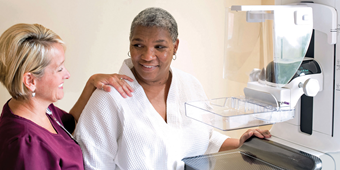Straight Talk on Preventing Uterine Cancer

Answer a few questions and we'll provide you with a list of primary care providers that best fit your needs.
Like most things in life, there’s no guaranteed plan for preventing uterine cancer.
But like many things in life, you can lower your chances of encountering this most common cancer of the female organs by avoiding what puts you at risk and doing more of what protects you. Some things you just can’t change. But knowing your personal risk can help in itself. Plus, the main safeguards – keeping a healthy weight and active habits – may already be natural parts of your life. And if they aren't, they can be.
So, let's discuss the core facts in preventing uterine cancer.
Be Aware of Your Estrogen Exposure
Uterine cancer is linked to high exposure to the hormone estrogen. So, if you started your period early, went through menopause late or have never been pregnant or breastfed, you have had more contact with estrogen.
Women who are obese have more than three times the chance of developing uterine cancer.
On the other hand, these lower your estrogen contact and can lower your risk:
 Multiple Pregnancies and Breastfeeding: When you’re pregnant, your hormone balance shifts toward less estrogen and more progesterone. Having children or breastfeeding for more than 18 months help protect against uterine cancer.
Multiple Pregnancies and Breastfeeding: When you’re pregnant, your hormone balance shifts toward less estrogen and more progesterone. Having children or breastfeeding for more than 18 months help protect against uterine cancer.- Combination Birth Control Pills: Taking birth control that combines both estrogen and progestin lowers your risk. The more years you take it, the more protection against uterine cancer. But don’t use birth control pills simply to reduce your risk of uterine cancer. Long-term use of birth control carries other health issues that are important to discuss with your doctor.
- IUDs that don’t contain hormones
- Combination Hormone Replacement Therapy (HRT): While estrogen-only HRT increases your chance of uterine cancer, combining it with progesterone may lower that risk. If you are considering HRT for menopause symptoms, talk to your doctor about the best approach for you.
One Curious Risk Reducer
- Cigarette smoking: Surprisingly, the National Cancer Institute says there is solid evidence to show that smoking cigarettes decreases your risk of uterine cancer. But smoking also increases your risk of cardiovascular disease and cancers of the head and neck, lung, bladder and pancreas. Smoking’s serious risks – and a lifespan shortened by an average of 10 years – make this a no-go option.
Two Main Ways to Protect
Fortunately, the two best ways to help you prevent uterine cancer are clear-cut and you've got what it takes to do them.
- For one, it’s essential to get to and keep a weight that is right for your body. Women who are obese have more than three times the chance of developing uterine cancer. Find a healthy weight loss plan and do your best to be consistent with it. If you need help, don't be embarrassed to ask; you can talk to your health care provider about how to get started.
- Second, be active. Studies have linked an active lifestyle to a lower uterine cancer risk. If you're a beginner with exercise, talk to your doctor and start out slow. Work it into your daily habits – you'll not only reduce your risk of getting this cancer, but you'll feel better, too.
So, what's the main takeaway? Some risk factors are unavoidable, but keeping healthy through weight loss and exercise is good for your uterine cancer odds and the rest of life, too.
Answer a few questions and we'll provide you with a list of primary care providers that best fit your needs.
Source: cancer.net; National Cancer Institute; American Cancer Society




